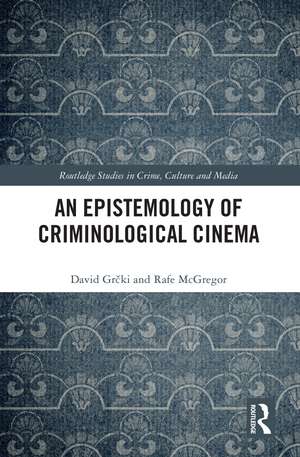An Epistemology of Criminological Cinema: Routledge Studies in Crime, Culture and Media
Autor David Grčki, Rafe McGregoren Limba Engleză Hardback – 23 apr 2024
Taking three social problems as its subjects – capitalist political economy, structural injustice, and racism – the book explores the ways in which David Fincher’s Fight Club (1999), HBO’s Game of Thrones (2011–2019), and Jordan Peele’s Us (2019) offer solutions by reconceiving justice in terms of personal and collective transformation, utopian thinking, and the relationship between racism and elitism, respectively. In doing so, the authors set out a theory of understanding the world based on cinematic and televisual works of art and conclude with a template that establishes a methodology for future use.
An Epistemology of Criminological Cinema is authoritative and accessible, ideal reading for undergraduate and postgraduate students, criminologists, philosophers, and film, television, and literary critics with an interest in social justice and social harm.
Preț: 999.16 lei
Preț vechi: 1218.48 lei
-18% Nou
Puncte Express: 1499
Preț estimativ în valută:
191.18€ • 199.61$ • 158.23£
191.18€ • 199.61$ • 158.23£
Carte tipărită la comandă
Livrare economică 05-19 aprilie
Preluare comenzi: 021 569.72.76
Specificații
ISBN-13: 9781032441184
ISBN-10: 1032441186
Pagini: 142
Dimensiuni: 156 x 234 x 10 mm
Greutate: 0.42 kg
Ediția:1
Editura: Taylor & Francis
Colecția Routledge
Seria Routledge Studies in Crime, Culture and Media
Locul publicării:Oxford, United Kingdom
ISBN-10: 1032441186
Pagini: 142
Dimensiuni: 156 x 234 x 10 mm
Greutate: 0.42 kg
Ediția:1
Editura: Taylor & Francis
Colecția Routledge
Seria Routledge Studies in Crime, Culture and Media
Locul publicării:Oxford, United Kingdom
Public țintă
Academic, Postgraduate, and Undergraduate AdvancedNotă biografică
David Grčki is a philosopher and a film scholar who specializes in narrative aesthetics, film theory, and critical thinking. He is an associate lecturer in the Department of Philosophy at the University of Rijeka.
Rafe McGregor is the author of eight books, including The Value of Literature (2016) and Literary Theory and Criminology (2023). He is Reader in Criminology at Edge Hill University in the UK, where he researches culture, political violence, and policing.
Rafe McGregor is the author of eight books, including The Value of Literature (2016) and Literary Theory and Criminology (2023). He is Reader in Criminology at Edge Hill University in the UK, where he researches culture, political violence, and policing.
Recenzii
"Engaging and challenging, this book posits the value and usefulness of the term ‘criminological cinema’. Grčki and McGregor offer an important philosophical engagement with criminology around a central but neglected facet of understanding: epistemology. Using case studies, they examine concepts of social harm and (in)justice, to illustrate that cinema has a valuable epistemological and pedagogical role in criminological analysis." - Professor Jon Frauley, University of Ottawa
"A timely and original contribution working at the intersection of criminology and epistemology, Grčki and McGregor argue that screen stories which have epistemic and moral value can be used to reconceptualize justice, improving people’s lives and changing the world for the better. The discussion of examples makes their argument insightful and the reading absolutely enjoyable." - Professor Íngrid Vendrell-Ferran, University of Marburg
"In this compelling and innovative book, Grčki and McGregor forge new paths for criminological engagement with cinema. Masterfully drawing together epistemic threads, they highlight and enliven existing affinities between zemiology and criminology. Beyond visual criminology, crime and media, there are new analytical frontiers where cinematic images are taken into account alongside the social and material forces of harm. Grčki and McGregor offer some of the first explorations of those frontiers. For anyone teaching, researching, or reading at the intersection of harm, criminology, and cinema, this is a must-have book." - Dr Bill McClanahan, University of Tennessee, Knoxville
"A timely and original contribution working at the intersection of criminology and epistemology, Grčki and McGregor argue that screen stories which have epistemic and moral value can be used to reconceptualize justice, improving people’s lives and changing the world for the better. The discussion of examples makes their argument insightful and the reading absolutely enjoyable." - Professor Íngrid Vendrell-Ferran, University of Marburg
"In this compelling and innovative book, Grčki and McGregor forge new paths for criminological engagement with cinema. Masterfully drawing together epistemic threads, they highlight and enliven existing affinities between zemiology and criminology. Beyond visual criminology, crime and media, there are new analytical frontiers where cinematic images are taken into account alongside the social and material forces of harm. Grčki and McGregor offer some of the first explorations of those frontiers. For anyone teaching, researching, or reading at the intersection of harm, criminology, and cinema, this is a must-have book." - Dr Bill McClanahan, University of Tennessee, Knoxville
Cuprins
1 Introduction
2 Criminological cinema
3 Transformative justice
4 Utopian justice
5 Deterministic justice
6 Cinematic epistemology
7 Conclusion
2 Criminological cinema
3 Transformative justice
4 Utopian justice
5 Deterministic justice
6 Cinematic epistemology
7 Conclusion
Descriere
Standing at the intersection of criminology and philosophy, this book demonstrates the ways in which mythic movies and television series can provide understanding of actual crimes and social harms.












